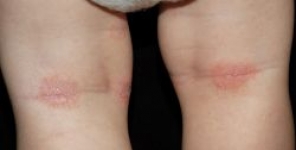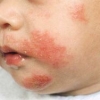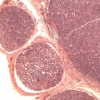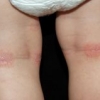Effetto di una dieta diagnostica ipoallergenica negli adolescenti e nei pazienti adulti che sono affetti da dermatite atopica
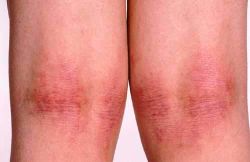 Valutare l'effetto di una dieta diagnostica ipoallergenica sulla gravità della dermatite atopica nei pazienti con più di 14 anni di età.
Valutare l'effetto di una dieta diagnostica ipoallergenica sulla gravità della dermatite atopica nei pazienti con più di 14 anni di età.
Materiali e Metodi: Ai pazienti affetti da dermatite atopica è stata consigliata una dieta diagnostica ipoallergenica per un periodo di 3 settimane. La gravità della dermatite atopica è stata valutata all'inizio e alla fine di questa dieta (SCORAD I, SCORAD II) ed è stata statisticamente valutata la differenza dello SCORAD in questo periodo.
Risultati: Centoquarantanove (149) pazienti affetti da dermatite atopica sono stati inclusi nello studio: 108 donne e 41 uomini. L'età media dei soggetti è stata di 26.03 (SD: 9.6 anni), con le età che variavano da un minimo di 14 anni ad un massimo di 63 anni. Lo SCORAD medio all'inizio dello studio (SCORAD I) è stato di 32.9 punti (SD: 14.1) e lo SCORAD medio alla fine della dieta (SCORAD II) è stato di 25.2 punti (SD: 9.99). La differenza tra lo SCORAD I e lo SCORAD II è stata valutata con il test Wilcoxon dei ranghi con segno. La diminuzione media di SCORAD è stata di 7.7 punti, che è statisticamente significativa (P = .00000).
Conclusione: L'introduzione della dieta diagnostica ipoallergenica può servire come "soluzione medica temporanea" nei pazienti affetti da forme moderate o gravi di dermatite atopica. Si raccomanda che questa dieta venga utilizzata nella procedura diagnostica delle allergie alimentari.
Storia della pubblicazione:
Titolo: The Effect of Hypoallergenic Diagnostic Diet in Adolescents and Adult Patients Suffering from Atopic Dermatitis
Rivista: Indian Journal of Dermatology. doi: 10.4103/0019-5154.103065
Autori: Jarmila Celakovská, K Ettlerová, K Ettler, J Bukac, M Belobrádek
Affiliazioni: Department of Dermatology and Venereology, Faculty Hospital and Medical Faculty of Charles University, Hradec Králové, Czech Republic
Department of Allergy and Clinical Immunology, Outpatient Clinic, Hradec Králové, Czech Republic
Department of Medical Biophysics, Medical Faculty of Charles University in Hradec Králové, Czech Republic
Abstract:
Aim: To evaluate the effect of a diagnostic hypoallergenic diet on the severity of atopic dermatitis in patients over 14 years of age. Materials and Methods: The diagnostic hypoallergenic diet was recommended to patients suffering from atopic dermatitis for a period of 3 weeks. The severity of atopic dermatitis was evaluated at the beginning and at the end of this diet (SCORAD I, SCORAD II) and the difference in the SCORAD over this period was statistically evaluated. Results: One hundred and forty-nine patients suffering from atopic dermatitis were included in the study: 108 women and 41 men. The average age of the subjects was 26.03 (SD: 9.6 years), with the ages ranging from a minimum of 14 years to a maximum of 63 years. The mean SCORAD at the beginning of the study (SCORAD I) was 32.9 points (SD: 14.1) and the mean SCORAD at the end of the diet (SCORAD II) was 25.2 points (SD: 9.99). The difference between SCORAD I and SCORAD II was evaluated with the Wilcoxon signed-rank test. The average decrease of SCORAD was 7.7 points, which was statistically significant (P=.00000). Conclusion: Introduction of the diagnostic hypoallergenic diet may serve as a temporary medical solution" in patients suffering from moderate or severe forms of atopic dermatitis. It is recommended that this diet be used in the diagnostic workup of food allergy.
